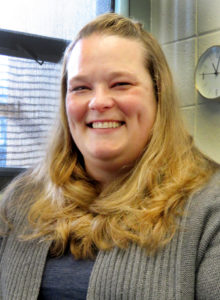When she became a Colorado State University employee in 2008, Rochelle Braaten didn’t set out to become an expert in higher education policies and benefits for veteran and military students.
Then, as a representative in the Financial Aid office, Braaten met with a student-veteran who had questions about how his veteran benefits worked. “I was able to help him,” says Braaten. “He told his friends, and suddenly, I was working with more members of the CSU military population.”
 In 2013, Braaten transitioned to the Office of Military and Veteran Benefits, a division of the Registrar’s Office, to work solely with military students as a School Certifying Official and Student Veteran Coordinator.
In 2013, Braaten transitioned to the Office of Military and Veteran Benefits, a division of the Registrar’s Office, to work solely with military students as a School Certifying Official and Student Veteran Coordinator.
“I have a weird knack to be able to keep policies in my head,” she says.
This ability to remember how military and veteran policies and benefits work with legislation and various government agencies serves Braaten well in her daily work.
“Rochelle is one of the key people on this campus who is an expert on how to help student veterans understand their benefits and learn to navigate the intricacies of higher education,” says Erica Schelly, a fellow student veteran coordinator who works alongside Braaten. “She is always willing to go the extra mile to help a student or a colleague, and she goes out of her way to make people feel valued and appreciated.”
When she decided to pursue a master’s program, she knew the Organizational Learning, Performance and Change M.Ed. would offer her the opportunity to blend knowledge of workplace learning and development with an understanding of how people work and their motivations.
“The program is focused on solving problems,” says Braaten. “It allowed me to learn how to look at people’s work environments in a big-picture way.”
Braaten started the program in 2013, taking classes online while continuing to work her full-time job at CSU. “It is truly amazing that she has been able to continue to excel in her full-time position while also completing her master’s degree,” says Schelly.
Braaten’s capstone project researched veterans in STEM majors, focusing on learning what roadblocks keep them from being admitted to or completing STEM programs. The primary issues facing military students in the classroom, says Braaten, are access to instructors and the transition from military life to life on campus.
“Veterans are on a tight deadline with their benefits — they have a specific amount of time to use [the benefits],” she explains. “Often, these students need access to the instructors directly, to get answers from the subject matter expert.”
Providing this availability, she continues, can make a difference in the success of military students in these programs. Additionally, Braaten has learned the importance of preparing military students for the adjustments they’ll need to make as they transition into a four-year degree program. “The transition isn’t necessarily easier on adult learners or veterans than it is on students who’ve recently graduated from high school. They have different responsibilities, and may be dealing with a change in identity now that they’ve left the military.”
“Rochelle’s passion for our veteran students is not only evident in her informative and compassionate conversations with the students and their families, but also in the very fact that she chose to focus on furthering and fostering understanding for our veteran students as her master’s capstone research project,” says Brianna Sprole, another of Braaten’s colleagues. “As her coworker, I can attest that her knowledge of the veteran educational benefits landscape has helped both her students, and myself, tremendously.”
With graduation nearing, Braaten plans to continue applying what she’s learned through the OLPC program to her work with the military student population. Although she’s decided to take a break from schooling for now, she is considering the OLPC doctoral program in the future.
“I would love to continue researching military students in higher education, and propose solutions,” she says.